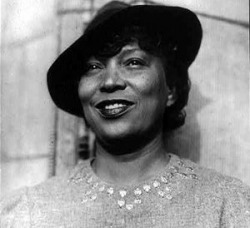Their Eyes Were Watching God
Zora Neale Hurston

Author Zora Neal Hurston, considered one of the greatest African American writers of the twentieth century, was born on January 7, 1891 in Notasulga, Alabama. Hurston was the fifth of eight children of John and Lucy Ann Potts Hurston. Her father was a Baptist preacher, tenant farmer, and carpenter. She later, at the age of three, moved with her family to Eatonville, Florida--the first all black community in the United States. There, the Jim Crow Laws, which were clearly evident throughout the South, did not exist. Hurston later used Eatonville as the setting in her writings as a place that black Americans could live without prejudices and social injustices.
Upon reaching adulthood, Hurston remained illiterate receiving little education. In 1917, while in Baltimore, Maryland, she enrolled in Morgan Academy. After on year, she graduated in 1918. After, she decided to attend Howard University in Washington D.C. Here, her literature professor influenced and inspired Hurston to pursue her literary career. In 1921, she wrote her first short story, “John Redding Goes to Sea.” It was published in the Howard literary magazine The Stylus. This and other short stories and poems caught the attention of well known poets Langston Hughes and Countee Cullen, active members of the Harlem Renaissance. From Howard University, Hurston transferrd to Barnard College where she, in 1928, received her Bachelors Degree in anthropology. After college, she immersed herself in black culture, becoming an active member of the Harlem Renaissance. Her literary works described a “New Negro” that could overcome racial injustices. In 1934 her first novel Jonah's Gourd Vine was published. Set in the fictional town of Sanford, it tells of Jonah, a black Baptist preacher who has a weakness for women. Critics praised the novel for depiction of Negro life. Later, in 1937, Hurston’s second novel, Their Eyes Were Watching God, was published. Perhaps her most famous, it chronicled a woman overcoming the strict standards of society to achieve her dream of finding true love through each of her three marriages. However, throughout her literary career, Hurston garnered criticism for not fully depicting the atrocities of racism. It seemed that she wrote her novels from her idea of Eatonville.
Poverty unfortunately marked the last years of Hurston’s life as she worked as a domestic. Finally, in 1959 Hurston suffered a severe stoke and was committed to the Saint Lucie County Welfare Home in Fort Pierce, Florida. It was here that Zora Neale Hurston, “ the prototypical authority on black culture from the Harlem Renaissance” (Lakewood Public Library), died of hypertensive heart disease on Jan. 28, 1960.
Upon reaching adulthood, Hurston remained illiterate receiving little education. In 1917, while in Baltimore, Maryland, she enrolled in Morgan Academy. After on year, she graduated in 1918. After, she decided to attend Howard University in Washington D.C. Here, her literature professor influenced and inspired Hurston to pursue her literary career. In 1921, she wrote her first short story, “John Redding Goes to Sea.” It was published in the Howard literary magazine The Stylus. This and other short stories and poems caught the attention of well known poets Langston Hughes and Countee Cullen, active members of the Harlem Renaissance. From Howard University, Hurston transferrd to Barnard College where she, in 1928, received her Bachelors Degree in anthropology. After college, she immersed herself in black culture, becoming an active member of the Harlem Renaissance. Her literary works described a “New Negro” that could overcome racial injustices. In 1934 her first novel Jonah's Gourd Vine was published. Set in the fictional town of Sanford, it tells of Jonah, a black Baptist preacher who has a weakness for women. Critics praised the novel for depiction of Negro life. Later, in 1937, Hurston’s second novel, Their Eyes Were Watching God, was published. Perhaps her most famous, it chronicled a woman overcoming the strict standards of society to achieve her dream of finding true love through each of her three marriages. However, throughout her literary career, Hurston garnered criticism for not fully depicting the atrocities of racism. It seemed that she wrote her novels from her idea of Eatonville.
Poverty unfortunately marked the last years of Hurston’s life as she worked as a domestic. Finally, in 1959 Hurston suffered a severe stoke and was committed to the Saint Lucie County Welfare Home in Fort Pierce, Florida. It was here that Zora Neale Hurston, “ the prototypical authority on black culture from the Harlem Renaissance” (Lakewood Public Library), died of hypertensive heart disease on Jan. 28, 1960.

